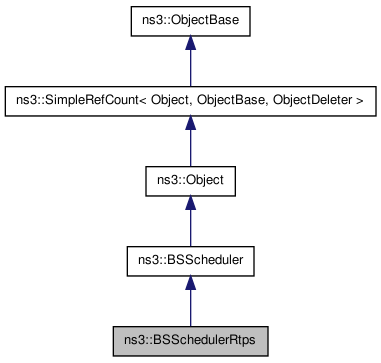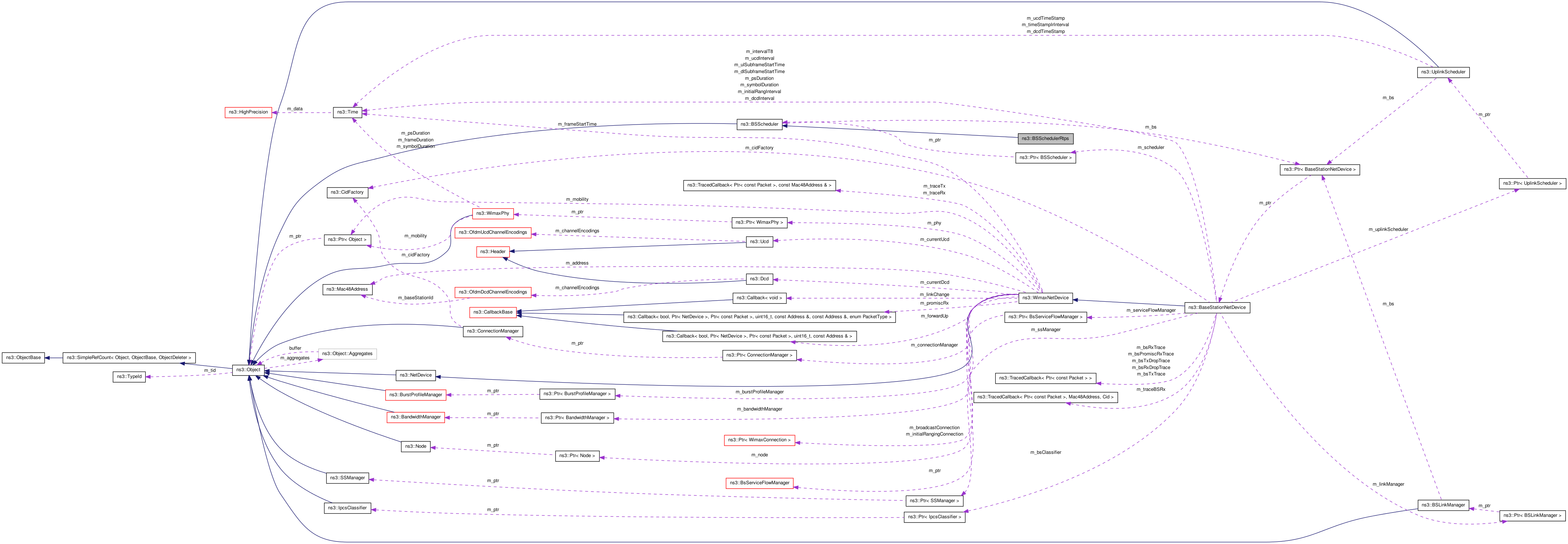This class implements a simple downlink scheduler for rtPS flows. More...
#include <bs-scheduler-rtps.h>


Public Member Functions | |
| BSSchedulerRtps (Ptr< BaseStationNetDevice > bs) | |
|
std::list< std::pair < OfdmDlMapIe *, Ptr < PacketBurst > > > * | GetDownlinkBursts (void) const |
| void | AddDownlinkBurst (Ptr< const WimaxConnection > connection, uint8_t diuc, WimaxPhy::ModulationType modulationType, Ptr< PacketBurst > burst) |
| void | Schedule (void) |
| Schedule function. | |
| bool | SelectIRandBCConnection (Ptr< WimaxConnection > &connection) |
| Check for IR and Broadcast connections that have packets to transmit. | |
| bool | SelectMenagementConnection (Ptr< WimaxConnection > &connection) |
| Check for Basic and Primary connections that have packets to transmit. | |
| bool | SelectUGSConnection (Ptr< WimaxConnection > &connection) |
| Check for UGS connections that have packets to transmit. | |
| bool | SelectRTPSConnection (Ptr< WimaxConnection > &connection) |
| Check for rtPS connections that have packets to transmit. | |
| bool | SelectNRTPSConnection (Ptr< WimaxConnection > &connection) |
| Check for nrtPS connections that have packets to transmit. | |
| bool | SelectBEConnection (Ptr< WimaxConnection > &connection) |
| Check for BE connections that have packets to transmit. | |
| bool | SelectConnection (Ptr< WimaxConnection > &connection) |
| void | BSSchedulerBroadcastConnection (uint32_t &availableSymbols) |
| void | BSSchedulerInitialRangingConnection (uint32_t &availableSymbols) |
| void | BSSchedulerBasicConnection (uint32_t &availableSymbols) |
| void | BSSchedulerPrimaryConnection (uint32_t &availableSymbols) |
| void | BSSchedulerUGSConnection (uint32_t &availableSymbols) |
| void | BSSchedulerRTPSConnection (uint32_t &availableSymbols) |
| Downlink Scheduler for rtPS connections. | |
| void | BSSchedulerNRTPSConnection (uint32_t &availableSymbols) |
| void | BSSchedulerBEConnection (uint32_t &availableSymbols) |
| Ptr< PacketBurst > | CreateUgsBurst (ServiceFlow *serviceFlow, WimaxPhy::ModulationType modulationType, uint32_t availableSymbols) |
Static Public Member Functions | |
| static TypeId | GetTypeId (void) |
| This method returns the TypeId associated to ns3::BSSchedulerRtps. | |
Detailed Description
This class implements a simple downlink scheduler for rtPS flows.
The DL-rtPS-Scheduler assigns the available bandwidth the service flows in the following order: IR Connections, Broadcast Connections, Basic and Primary Connections, UGS Connections, rtPS Connections, nrtPS Connections, BE Connections. The IR, Broadcast and Basic/Primary Connections must transmit all packet in the queue. The UGS flows can transmit the quota of date equal to the "Grant Size" (that is one of service flows QoS parameters) according to their requested MaxLatency (another QoS parameter). All rtPS flows are able to transmit all packet in the queue according to the available bandwidth. The bandwidth saturation control has been implemented to redistribute the effective available bandwidth to all rtPS flows that have at least one packet to transmit. The remaining bandwidth is allocated to rntPS and BE Connections.
Member Function Documentation
| void ns3::BSSchedulerRtps::BSSchedulerRTPSConnection | ( | uint32_t & | availableSymbols | ) |
Downlink Scheduler for rtPS connections.
- Parameters:
-
availableSymbols available symbols for rtPS flows
This method represent the DL Scheduler for rtPS connections. The scheduler is designed to serve all rtPS connections that have at least one packet to transmit, every DL Subframe. To each rtPS connections are allocated, at the beginning, the bandwidth to transmit a quota of data equal to the queue length. If the sum of all pre-allocated bandwidth exceed the available symbols for rtPS connections, the Channel Saturation Control function is called to redistribute the available bandwidth.
| static TypeId ns3::BSSchedulerRtps::GetTypeId | ( | void | ) | [static] |
This method returns the TypeId associated to ns3::BSSchedulerRtps.
This object is accessible through the following paths with Config::Set and Config::Connect:
- /NodeList/[i]/DeviceList/[i]/$ns3::AlohaNoackNetDevice/Phy/$ns3::BSSchedulerRtps
- /NodeList/[i]/DeviceList/[i]/$ns3::BaseStationNetDevice/BsIpcsPacketClassifier/$ns3::BSSchedulerRtps
- /NodeList/[i]/DeviceList/[i]/$ns3::BaseStationNetDevice/LinkManager/$ns3::BSSchedulerRtps
- /NodeList/[i]/DeviceList/[i]/$ns3::BaseStationNetDevice/SSManager/$ns3::BSSchedulerRtps
- /NodeList/[i]/DeviceList/[i]/$ns3::BaseStationNetDevice/ServiceFlowManager/$ns3::BSSchedulerRtps
- /NodeList/[i]/DeviceList/[i]/$ns3::NonCommunicatingNetDevice/Phy/$ns3::BSSchedulerRtps
- /NodeList/[i]/DeviceList/[i]/$ns3::SubscriberStationNetDevice/Classifier/$ns3::BSSchedulerRtps
- /NodeList/[i]/DeviceList/[i]/$ns3::SubscriberStationNetDevice/LinkManager/$ns3::BSSchedulerRtps
- /NodeList/[i]/DeviceList/[i]/$ns3::SubscriberStationNetDevice/SSScheduler/$ns3::BSSchedulerRtps
- /NodeList/[i]/DeviceList/[i]/$ns3::UanNetDevice/Channel/NoiseModel/$ns3::BSSchedulerRtps
- /NodeList/[i]/DeviceList/[i]/$ns3::UanNetDevice/Channel/PropagationModel/$ns3::BSSchedulerRtps
- /NodeList/[i]/DeviceList/[i]/$ns3::UanNetDevice/Mac/$ns3::BSSchedulerRtps
- /NodeList/[i]/DeviceList/[i]/$ns3::UanNetDevice/Phy/$ns3::BSSchedulerRtps
- /NodeList/[i]/DeviceList/[i]/$ns3::UanNetDevice/Transducer/$ns3::BSSchedulerRtps
- /NodeList/[i]/DeviceList/[i]/$ns3::WimaxNetDevice/$ns3::BaseStationNetDevice/BsIpcsPacketClassifier/$ns3::BSSchedulerRtps
- /NodeList/[i]/DeviceList/[i]/$ns3::WimaxNetDevice/$ns3::BaseStationNetDevice/LinkManager/$ns3::BSSchedulerRtps
- /NodeList/[i]/DeviceList/[i]/$ns3::WimaxNetDevice/$ns3::BaseStationNetDevice/SSManager/$ns3::BSSchedulerRtps
- /NodeList/[i]/DeviceList/[i]/$ns3::WimaxNetDevice/$ns3::BaseStationNetDevice/ServiceFlowManager/$ns3::BSSchedulerRtps
- /NodeList/[i]/DeviceList/[i]/$ns3::WimaxNetDevice/$ns3::SubscriberStationNetDevice/Classifier/$ns3::BSSchedulerRtps
- /NodeList/[i]/DeviceList/[i]/$ns3::WimaxNetDevice/$ns3::SubscriberStationNetDevice/LinkManager/$ns3::BSSchedulerRtps
- /NodeList/[i]/DeviceList/[i]/$ns3::WimaxNetDevice/$ns3::SubscriberStationNetDevice/SSScheduler/$ns3::BSSchedulerRtps
- /NodeList/[i]/DeviceList/[i]/$ns3::WimaxNetDevice/BandwidthManager/$ns3::BSSchedulerRtps
- /NodeList/[i]/DeviceList/[i]/$ns3::WimaxNetDevice/BurstProfileManager/$ns3::BSSchedulerRtps
- /NodeList/[i]/DeviceList/[i]/$ns3::WimaxNetDevice/Channel/$ns3::UanChannel/NoiseModel/$ns3::BSSchedulerRtps
- /NodeList/[i]/DeviceList/[i]/$ns3::WimaxNetDevice/Channel/$ns3::UanChannel/PropagationModel/$ns3::BSSchedulerRtps
- /NodeList/[i]/DeviceList/[i]/$ns3::WimaxNetDevice/ConnectionManager/$ns3::BSSchedulerRtps
- /NodeList/[i]/DeviceList/[i]/$ns3::WimaxNetDevice/Phy/Channel/$ns3::UanChannel/NoiseModel/$ns3::BSSchedulerRtps
- /NodeList/[i]/DeviceList/[i]/$ns3::WimaxNetDevice/Phy/Channel/$ns3::UanChannel/PropagationModel/$ns3::BSSchedulerRtps
No Attributes defined for this type.
No TraceSources defined for this type.
Reimplemented from ns3::BSScheduler.
| bool ns3::BSSchedulerRtps::SelectIRandBCConnection | ( | Ptr< WimaxConnection > & | connection | ) |
Check for IR and Broadcast connections that have packets to transmit.
- Parameters:
-
connection will point to a initial ranging or broadcast connection wich have packets to transmit
- Returns:
- false if no initial ranging or broadcast connection has packets to transmit, true otherwise
| bool ns3::BSSchedulerRtps::SelectMenagementConnection | ( | Ptr< WimaxConnection > & | connection | ) |
Check for Basic and Primary connections that have packets to transmit.
- Parameters:
-
connection will point to a basic or primary connection wich have packets to transmit
- Returns:
- false if no basic or primary connection has packets to transmit, true otherwise
| bool ns3::BSSchedulerRtps::SelectUGSConnection | ( | Ptr< WimaxConnection > & | connection | ) |
Check for UGS connections that have packets to transmit.
The method return the UGS connection that have packets to transmits, according to the MaxLatency specifications.
The documentation for this class was generated from the following files:
- src/devices/wimax/bs-scheduler-rtps.h
- doc/introspected-doxygen.h
 1.7.1
1.7.1